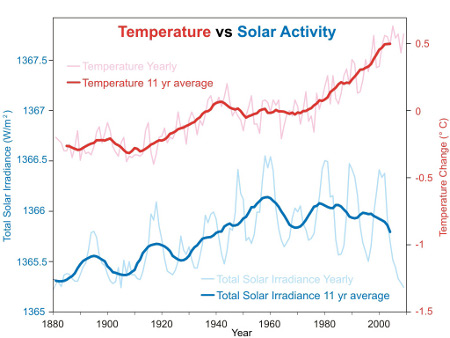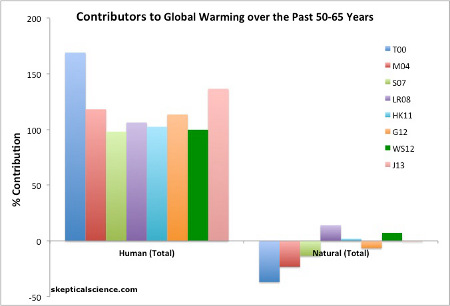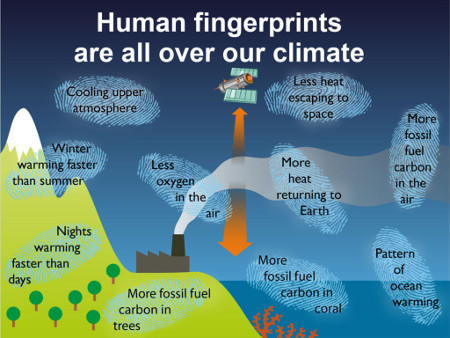The fifth Intergovernmental Panel on Climate Change (IPCC) report states with 95 percent confidence that humans are the main cause of the current global warming. Many media outlets have reported that this is an increase from the 90 percent certainty in the fourth IPCC report, but actually the change is much more significant than that. In fact, if you look closely, the IPCC says that humans have most likely caused all of the global warming over the past 60 years.
What's causing global warming: human greenhouse gas emissions.
"The best estimate of the human-induced contribution to warming is similar to the observed warming over this period ... The observed warming since 1951 can be attributed to the different natural and anthropogenic drivers and their contributions can now be quantified. Greenhouse gases contributed a global mean surface warming likely to be in the range of 0.5°C to 1.3 °C over the period 1951−2010, with the contributions from other anthropogenic forcings, including the cooling effect of aerosols, likely to be in the range of −0.6°C to 0.1°C."
What's not causing global warming: natural external factors like solar activity, and natural internal factors like ocean cycles.
"The contribution from natural forcings is likely to be in the range of −0.1°C to 0.1°C, and from internal variability is likely to be in the range of −0.1°C to 0.1°C."
We've observed about 0.6°C average global surface warming over the past 60 years. During that time, the IPCC best estimate is that greenhouse gases have caused about 0.9°C warming, which was partially offset by about 0.3°C cooling from human aerosol emissions. During that time, natural external factors had no net influence on global temperatures. For example, solar activity has been flat since 1950.

Annual global temperature change (thin light red) with 11 year moving average of temperature (thick dark red). Temperature from NASA GISS. Annual Total Solar Irradiance (TSI; thin light blue) with 11 year moving average of TSI (thick dark blue). TSI from 1880 to 1978 from Krivova et al (2007). TSI from 1979 to 2009 from PMOD.
As for the natural internal variability of the Earth's climate system, short-term noise averages out to zero over long time frames. Warm and cool ocean cycles cancel each other out, and thus internal variability has no long-term influence on average global temperatures.
Put it all together, and the IPCC is 95 percent confident that humans have caused most of the observed global surface warming over the past 60 years. Their best estimate is that humans have caused 100 percent of that global warming.
IPCC is Summarizing the Scientific Research
The IPCC does not conduct any original research; it's a summary report, and these statements accurately reflect the body of climate science research. For example, last year climate scientists Tom Wigley and Ben Santer published a paper concluding that human climate influences were responsible for 50 to 150 percent of the observed warming from 1950 to 2005.
Like this new IPCC statement, they found 95 percent probability that humans have caused at least half the observed warming since 1950, and most likely all of it. It's also possible that humans have caused more warming than has been observed because natural factors may have had a net cooling effect. The Wigley and Santer results are consistent with the body of scientific research on the causes of global warming.

Net human and natural percent contributions to the observed global surface warming over the past 50-65 years according to Tett et al. 2000 (T00, dark blue), Meehl et al. 2004 (M04, red), Stone et al. 2007 (S07, light green), Lean and Rind 2008 (LR08, purple), Huber and Knutti 2011 (HK11, light blue), Gillett et al. 2012 (G12, orange), Wigley and Santer 2012 (WS12, dark green), and Jones et al. 2013 (J12, pink).
The 'fingerprints' of climate change are also all consistent with what we expect to see as a result of human-caused global warming, for example changes in the atmosphere, as another paper by Ben Santer recently concluded.

Summary of observational evidence that human carbon dioxide emissions are causing the climate to warm.
What About the Naysayers?
A few naysayers like Judith Curry from Georgia Tech have disputed the IPCC confidence on this question, for example in an interview with the reliably inaccurate David Rose.
However, while Curry is a climate scientist, she doesn't research the causes of global warming. She also has a history of exaggerating climate uncertainties. Her comments are inconsistent with the body of scientific research on the subject. Put simply, she is speaking outside her area of expertise, like a podiatrist giving advice on open heart surgery.
The 97 Percent Consensus is Evidence-Based
This is why there's a 97 percent consensus amongst climate experts and in the climate science literature that humans are causing global warming. The scientific evidence on this question is overwhelming.
Many commenters have noted that the expert consensus is itself not scientific evidence for human-caused global warming. That's true. The expert consensus is however based on the scientific evidence. The fact that 97 percent of climate experts agree on this subject also demonstrates the strength of the scientific evidence on human-caused global warming. And the strength of the evidence is why the IPCC is able to say with 95 percent confidence that humans are the main cause of the current global warming.
Basic rebuttal written by dana1981
Updated on 2015-07-10 by MichaelK.
































 Arguments
Arguments





























